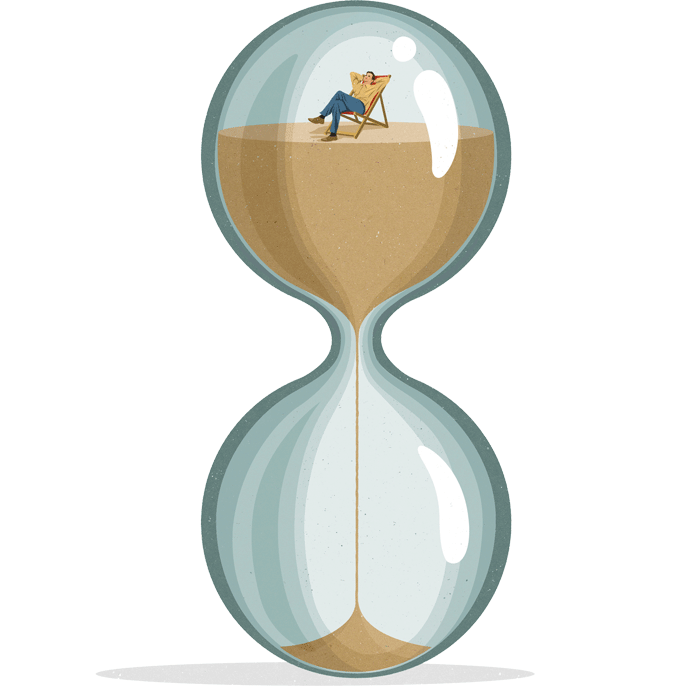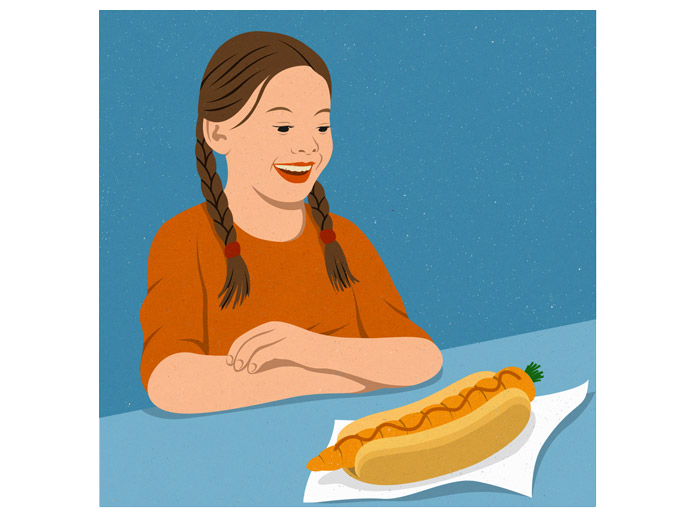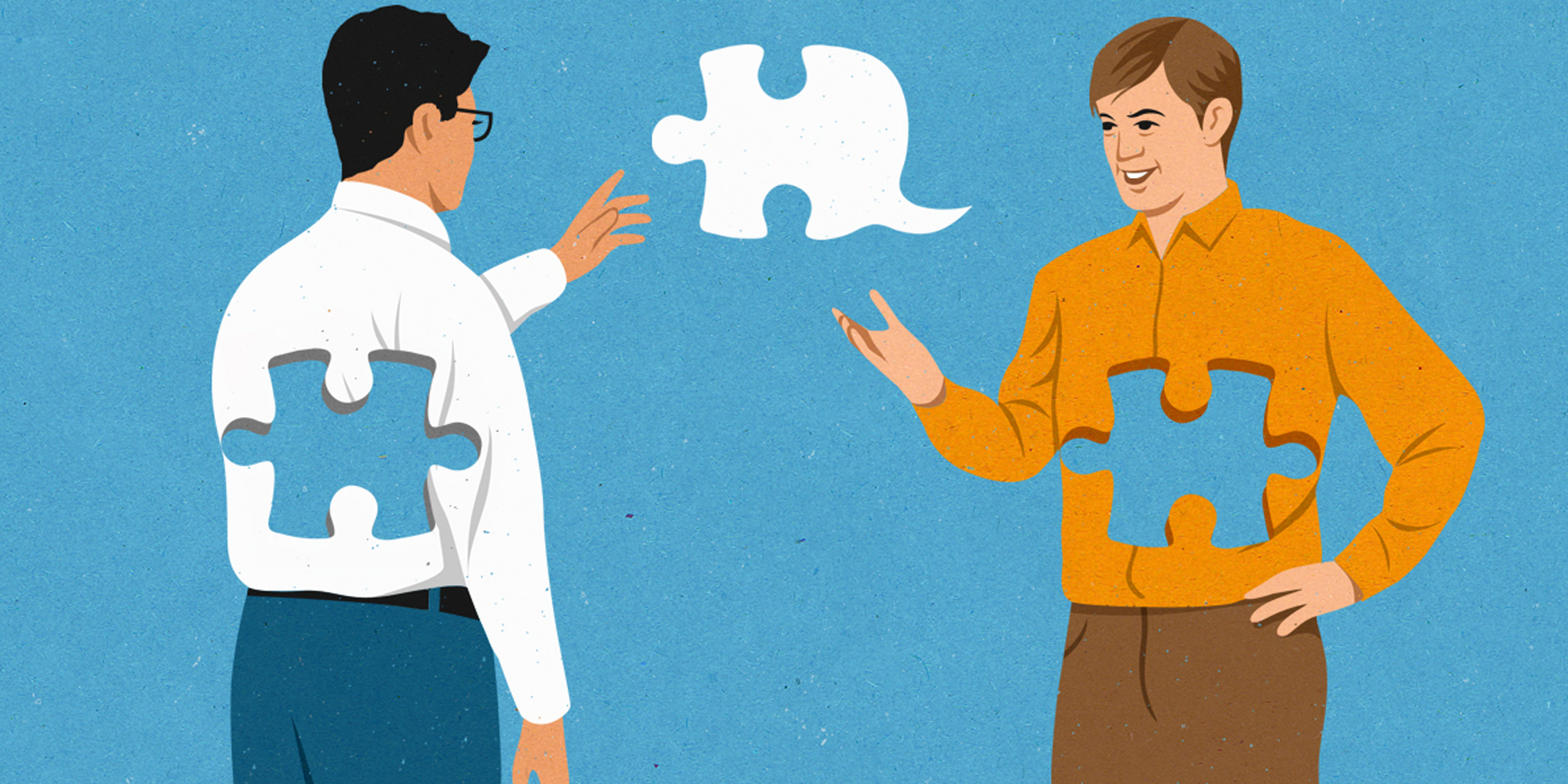
(All illustrations by John Holcroft)
Want to exercise more, save money, and eat healthier? Ayelet Fishbach’s research can help.
When Ayelet Fishbach is asked what she studies, she finds it hard to narrow down the list. “I often say that I study motivation,” she begins. And “I’m looking at patience, and how to increase patience, and why patience is the key to success in life. How people learn from failure and why they usually don’t.” She goes on: incentives, intrinsic motivation, self-control, goal setting.
What unites Fishbach’s research is a kind of hopefulness. Her work shows how we can live up to our highest aspirations. She’s written about exercising, healthy eating, and saving money—the hard-but-worth-it challenges that occupy many of our lives. None of her findings offer magic bullets, but they do suggest that self-improvement is achievable. Hers is a happy science.
Fishbach, the Jeffrey Breakenridge Keller Professor of Behavioral Science and Marketing at Chicago Booth, has always been interested in what makes people tick. She grew up on a kibbutz, where communal living gave her lots of opportunities for observation. “I feel like I was an amateur social psychologist way before I knew how to collect data and test my crazy or less crazy theories,” she says. She hasn’t stopped trying to understand human behavior: “I never found something more exciting to do.”
As a graduate student at Tel Aviv University, Fishbach stood out for her ability to translate theories into creative research methodologies focused on practical issues, recalls her doctoral adviser Yaacov Trope, now at New York University. “She has a good eye for how things manifest in real life,” he says.
Working in a business school, where applied research is especially valued, has allowed Fishbach to maintain this dual focus. Her research has important implications “for health and well-being, and happiness, even—but is still deeply interested in the underlying mechanism,” says her former student Kaitlin Woolley, PhD’17, an assistant professor at Cornell University.
Fishbach is excited by so much that she finds it hard to decide what to study next. Often she follows the trail of breadcrumbs left by her last publication. This fall Fishbach published a paper that showed that people struggling to achieve a goal are more motivated by giving advice than receiving it (see Heal Thyself, page 47). While running those experiments, she found that some of the participants felt they were unqualified to counsel anyone else. They’d say, “Why are you asking me how to lose weight? I’m obviously a failure.”
But Fishbach looked at it differently. To her, it seemed intuitive that struggling dieters would know the most about weight loss. A hypothesis formed: people don’t recognize the knowledge they’re gaining as they struggle. “That led to some working papers, which explore how people fail to learn from failures,” she says. “It is really just an idea that came from another idea.”
Fishbach, who came to Chicago Booth in 2002, has watched her field enter a new era of public prominence. Social scientists were presenting their research in TED Talks, best-selling books, and the pages of the New York Times. Governments around the world began making policy decisions based on behavioral science.
Then came the reckoning. Simmering discussions within the field took on new urgency after the publication of a 2015 paper in Science. It found that, of 100 influential psychology studies published in 2008, about half failed replication. This didn’t necessarily mean all of the original findings were wrong, but it suggested they needed a closer look. (One of Fishbach’s experiments was included; because of a lower response rate than the original study, the result was unreliable.) To some, both inside and outside the field, the discovery signaled that psychology needed to improve its methods. Others challenged the methods of the replication effort itself.
In the media, the moment was labeled a crisis. Fishbach sees it differently: “I think it’s just a lot of learning, and a lot of adjustment and development.” Along with the rest of her colleagues, she’s made changes. Today, for example, sample sizes are usually larger and calculated in advance of an experiment, “and not based on how many people we can easily get within the course of an academic quarter, which is what we used to do.”
Fishbach thinks these improvements are important, especially because policy makers are looking to psychology for insights as they develop interventions. “If you are going to apply any of this knowledge, you’d better have high standards for what is replicable and what are the effects.”
Fishbach knows firsthand that people want psychological guidance in their daily lives. She started watching TV on the treadmill after she learned that enjoyment predicts the likelihood of maintaining a workout regimen, even though fun isn’t the main reason we go to the gym (see A Spoonful of Sugar, page 49).
She falls short of her goals all the time, she admits, but she’s always trying. And when her motivation ebbs, her own research is there to point the way back.
Case studies: Life hacks from Ayelet Fishbach’s research
Wait for it … wait for it …
If you’ve ever endured a 90-minute wait for a restaurant table, you know that anticipation isn’t always a bad thing. It can make that waffle taste, somehow, all the more delicious. In a 2013 Journal of Organizational Behavior and Human Decision Processes study, Fishbach and former Chicago Booth postdoctoral scholar Xianchi Dai outlined several benefits of delayed gratification: the act of waiting not only makes us value something more, it also increases our patience and improves our decision making.
It’s a well-known psychological phenomenon that many people prefer receiving $10 now to $15 later. In the battle of less now versus more later, less now tends to triumph even though it’s financially irrational.
But what happens if you force people to delay making the choice between less now and more later? To test this notion, Fishbach and Dai divided their study participants into groups: The first group was told they would be entered into a lottery to win either $50 in three days or $55 in 23 days. The second could choose between the chance of winning $50 in 30 days or $55 in 50 days. The third group could choose between $50 in 30 days or $55 in 50 days, but they weren’t allowed to indicate their decision for 27 days—at which point their situation was identical to the first group’s.
Forcing people to mull their choice upended the typical preference for less now, the pair found. In the first group, just 31 percent of participants opted for $55 later over $50 sooner. That number rose to 56 percent in the second group. In the third group, a whopping 86 percent made the ultimately prudent choice of more later. The longer wait didn’t make people antsy—curiously, it actually increased their patience.
In a subsequent experiment involving a decision between a lottery for basic or fancier iPod models, Fishbach and Dai pinpointed the underlying mechanism: the longer we cool our jets, the more we tend to value the thing we’re waiting for. So, patience, grasshopper—good things may come to those who wait.
I say it’s spinach, and I say the hell with it!
Ah, the vegetable wars: you can cover broccoli with butter and cheese, serve it on the most enticing Dora the Explorer plate, or (if you’re feeling especially devious) bake it into cookies—but the truth is, no matter what you do, most kids don’t want to eat it.
It turns out that some of the problem may be how parents and marketers try to sell nutritious foods to kids. When it comes to healthy eating, you say it best when you say nothing at all, Fishbach and her coauthor Michal Maimaran discovered in a 2014 Journal of Consumer Research paper.
The duo conducted a study with 66 preschoolers and a whole lot of Wheat Thins. (In an experimental pretest, eight parents agreed this particular snack would be palatable to kids, and that kids would believe it was healthy.) The children were divided into three groups. Two groups heard a story about a girl named Tara who ate Wheat Thins before going out to play. In the first version of the story, Wheat Thins were presented as a snack that would make Tara strong. In the second, Wheat Thins were described as “yummy.” In the third, control version, the children got no story or message about Wheat Thins whatsoever.
Then the children were invited to snack on the crackers. It turned out the story they’d heard had a significant impact on how much they ate. Those who heard that Wheat Thins would make Tara strong ate, on average, just three crackers. Those who heard the snack was yummy ate an average of seven—and those who heard nothing about the benefits of Wheat Thins ate the most of all, an average of nine crackers.
What’s going on here? Kids see right through instrumental messages about food, Fishbach and Maimaran determined in subsequent experiments. They figure that if you’re trying to push something, it must not be tasty. So if you’ve got a picky eater on your hands, present that broccoli and say nothing. Silence is golden.
Heal thyself
When it comes to advice, it is truly better to give than to receive. That’s the conclusion of Fishbach’s 2018 paper in Psychological Science with Lauren Eskreis-Winkler and Angela Duckworth. The researchers compared the motivational effect of giving versus receiving advice in several areas, including losing weight and saving money. Across these varied domains, people who gave advice experienced a greater boost in motivation than those on the receiving end.
In the first experiment included in the paper, middle school students were assigned to either give advice to younger students on how to stay motivated in school or receive motivational advice from a teacher. In the weeks before and following the experiment, the students were given access to a voluntary online program for studying vocabulary. The researchers found that, in the weeks before the experiment, there was no difference in the amount of time students in the two groups spent studying vocabulary. But in the four weeks after, students who had offered words of wisdom devoted an average of 38 percent more minutes a week to vocab than the advice receivers.
Then Fishbach and her coauthors expanded the research to other areas and populations. They recruited online study participants who were struggling to find a job. The woebegone job seekers were asked to write advice for another person in the same situation and to read guidance from a job-search website. Next, they were asked to rate which they found most motivating. A sizable majority—68 percent—said they got more spring in their step from advising another person. When this process was repeated with strivers in other areas (weight loss, money management, and temper control), the same pattern emerged again and again.
It comes down to confidence, the team found. The process of giving someone else a pep talk restores the mojo you lost while you were falling short of your goals, because it forces you to remember past successful behaviors and experiences.
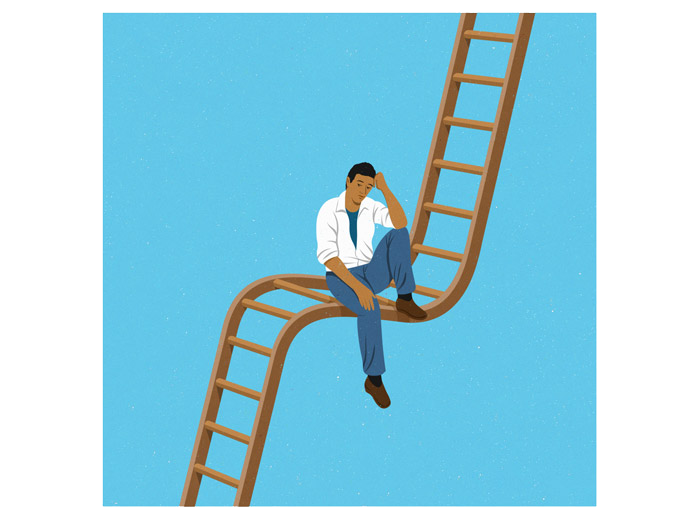 The messy middle
The messy middle
One o’clock at the office. Mile 1.5 of a three-mile run. Wednesday. There’s nothing more meh-inspiring than the halfway point. And it isn’t just our motivation that flags midway through an effort—we also tend to relax our ethical standards, Fishbach and Maferima Touré-Tillery, PhD’13, found in a 2011 paper in the Journal of Experimental Psychology.
In a witty bit of experimental design, Fishbach and Touré-Tillery tested this theory of cutting corners by having study participants, well, cut corners. They asked 60 college students to cut out, in sequence, five identical shapes labeled one through five. Two research assistants, unaware of the study’s premise, were asked to rate the quality of the participants’ shape cutting based on how well they stayed within the lines. The sloppiest cutting, they determined, came right in the middle of the process, on shape three of five.
As part of the same study, Fishbach and Touré-Tillery conducted a similar test involving coin flips. Participants in that experiment were given a coin and told to flip it. The self-reported outcome of each of the 10 coin flips determined whether they had to proofread a long or short passage of text.
Much like in the corner-cutting test, participants got squidgy as the coin flips progressed. On flips one and two, the proportion of subjects claiming to receive the favorable outcome of the coin flip—that is, proofreading the short passage—hovered at about 50 percent. That’s exactly what you’d expect, given the equal probability of either outcome. However, by the sixth coin flip, an implausible 72 percent of participants claimed the coin toss told them to do the easier task. On the final flip, that number dipped back down to 59 percent.
So why do we tend to do our best, most conscientious work at the beginning and end of a project? It’s because we unconsciously believe beginnings and endings are most reflective of our intentions and abilities, Fishbach concludes. Fortunately, we can trick ourselves into avoiding this semi-slump: you can create “short middles” by breaking big goals into smaller segments. Fishbach’s research also suggests that we can motivate ourselves at the midpoint by focusing less on what we’ve already accomplished and more on what lies ahead. (Just one more section until you’re done with this article.)
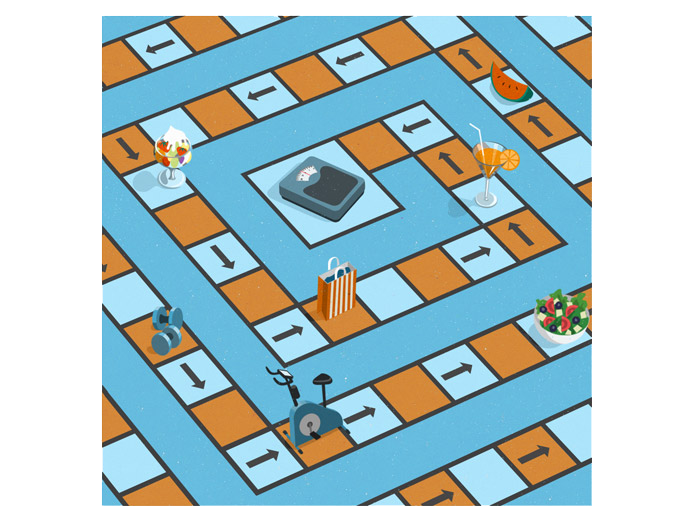 A spoonful of sugar
A spoonful of sugar
How much progress have you made on your New Year’s resolutions? The answer to that question may depend on whether you’re having fun along the way, according to a 2017 study in the Personality and Social Psychology Bulletin by Fishbach and her former student Woolley.
Many of us set New Year’s resolutions and other big goals because they provide long-term benefits: we exercise for our future health and save money for our financial security down the line. However, sticking to these plans gets tough precisely because the benefits are delayed. Losing weight in three months is all well and good, but Oreos taste delicious today.
Across several experiments, Woolley and Fishbach showed that, despite what we may think, what helps us persist in our goals isn’t single-minded focus on the future. Rather, it’s the presence of short-term rewards, such as enjoyment.
In one experiment that was part of the study, the researchers asked gym goers to rate from one to six how important it was that their workout be enjoyable (an immediate reward) and how important it was that their workout be useful at keeping them in shape (a delayed reward). Then they observed how long people actually worked out, and crunched the numbers.
On average, the participants rated the delayed reward of health as being more important than the immediate reward of enjoyment. However, only self-reported enjoyment significantly correlated with the amount of time they spent working out. They observed similar patterns in other areas, such as studying and healthy eating. Even though people were engaging in these activities with long-term goals in mind, their stick-to-itiveness depended on immediate rewards.
The takeaway? Find ways to nest immediate rewards within your long-term goal pursuits. If that means watching Law & Order on the treadmill, well, who are we to judge?

